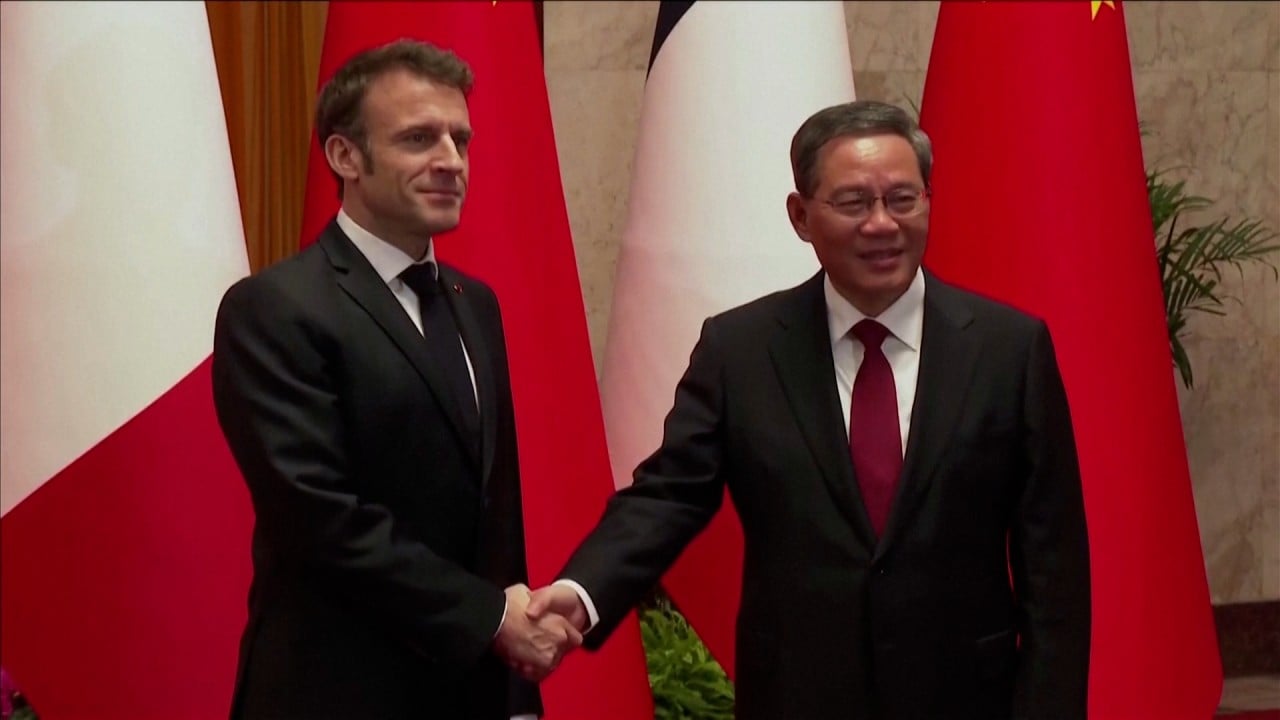
EU leader Ursula von der Leyen urges states to begin economic de-risking from China or face trouble
- A failure to do so means they should prepare for their businesses to be steamrollered by unfair Chinese competition, she tells bloc’s 27 member states
- ‘Geopolitics and geoeconomics need to be considered even more closely together and dealt with on a European level’
In an address to conservative lawmakers at the German Bundestag – the national parliament – she tried to drum up support for her de-risking agenda, suggesting that European businesses in China will eventually run into trouble if governments do not take action.
“Entire industries and value chains for which China used to rely on the rest of the world are being increasingly relocated domestically. Many European investors like to call this ‘in China for China’. However, this only works until European companies are squeezed out by Chinese competition or get caught up in political turmoil,” von der Leyen said.
‘Explicit element of rivalry’: EU warns of harsher stance on China before summit
Amid a lukewarm response among member states to her economic security strategy, she said “geopolitics and geoeconomics need to be considered even more closely together and dealt with on a European level”.
“We have strengthened European investment screening and export controls and precisely calibrated the responsibilities of the players at all levels. This means not only Europe, but also the member states at their various levels – everyone must contribute to the overall picture,” she said.
On Monday, foreign ministers once again bumped a debate on economic security off the agenda at their monthly meeting. The item had initially been scheduled for discussion in July, but is struggling for airtime amid competing crises in Gaza and Ukraine.
The strategy, first proposed in June, could see restrictions placed on private companies’ investments in certain hi-tech sectors in China, and an extension of the EU export controls regime. Some governments, however, are not sold on the prospect.
There is opposition to Brussels taking control of issues that are typically governed in national capitals, while free-marketeers in the union object to more restrictions being placed on trade.
“In future, we also want to ensure that the capital and expertise of European companies and cutting-edge research is not used to build up military capabilities,” von der Leyen said, in a reference to her proposal to screen outbound investments.
She told lawmakers that the EU’s record €400 billion (US$434 billion) trade deficit with China last year was “the calculated and declared result of China’s trade and security policy”.
“China’s declared strategy is to reduce its dependence on the world and at the same time increase the world’s dependence on China. This process is in full swing. China has been systematically buying up mines for critical raw materials for over 20 years,” von der Leyen added.
The Chinese economy, she said, “could be facing a phase of relative stagnation” – a trend that will place further strain on EU-China relations.
She warned lawmakers that “floods” of Chinese goods – overcapacity that would be exported because of the struggling domestic economy – were coming for Europe.
“It is foreseeable that Chinese companies will increasingly compete on the world markets with dumping prices and thus put pressure on global competitors. In other words, against the backdrop of the restrictive US policy, the attractive European domestic market will increasingly come into focus if we do not manage these effects carefully,” she said.
Top EU diplomat Borrell to visit China in October ahead of summit
In the Bundestag, von der Leyen stuck largely to economics, mentioning neither Ukraine nor Gaza, perhaps mindful of criticism from some national capitals recently for veering too far onto foreign policy territory.
But in a separate speech to two think tanks in Berlin, she cajoled China to do more on both fronts.
“China states that it is always impartial and favours peaceful solutions, for instance in the Middle East. So, every measure of influence that Beijing has needs to be used to prevent further escalation, and to work on the day after. China clearly aspires to playing more of a global role. And this new role should come with more responsibility, not less, for global peace and security,” she said.
Von der Leyen reiterated that China’s stance on “Russia’s war will define our mutual relationship for the years to come”.
“China says it upholds the UN Charter. But it does not distance itself from Russia’s war of aggression,” she said. “So how do we respond to that? I believe that the way forward is to keep engaging with Beijing, so that its support to Russia remains as limited as possible.”


